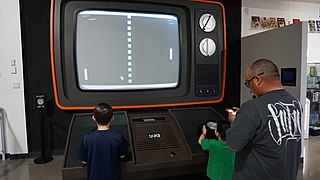Related Research Articles

A video game or computer game is an electronic game that involves interaction with a user interface or input device – such as a joystick, controller, keyboard, or motion sensing device – to generate visual feedback. This feedback is shown on a video display device, such as a TV set, monitor, touchscreen, or virtual reality headset. Video games are often augmented with audio feedback delivered through speakers or headphones, and sometimes with other types of feedback, including haptic technology.

A joystick is an input device consisting of a stick that pivots on a base and reports its angle or direction to the device it is controlling. A joystick, also known as the control column, is the principal control device in the cockpit of many civilian and military aircraft, either as a centre stick or side-stick. It often has supplementary switches to control various aspects of the aircraft's flight.
Lesbian, gay, bisexual, and transgender (LGBT) characters have been depicted in video games since the 1980s. In the history of video games, LGBT characters have been almost nonexistent for a long time, reflecting the overall heteronormativity of the medium. While there has been a trend towards greater representation of LGBT people in video games, they are frequently identified as LGBT in secondary material, such as comics, rather than in the games themselves. Gamesradar’s Sam Greer pored through thousands of gaming titles and found 179 games with any LGBT representation: Of those 179 games, only 83 have queer characters who are playable characters. And of those, only eight feature a main character who is pre-written as queer as opposed to them being queer as an option.

Gaymer and gay gamer are umbrella terms used to refer to the group of people who are identified as gay and have an active interest in video games or tabletop games, also known as gamers. Lesbian, bisexual, and transgender gamers are often categorized under this term.
MAGFest is an annual festival held in the Washington metropolitan area that celebrates video games and video game music, as well as their surrounding culture. MAGFest's primary features are a large open video gaming room, a hall of arcade cabinets, concerts by chiptune artists and video game cover bands, and a Bring Your Own Computer (BYOC) LAN Party.

Tracy Fullerton is an American game designer, educator and writer. She is a Professor in the USC Interactive Media & Games Division of the USC School of Cinematic Arts and Director of the Game Innovation Lab at USC. In 2014 she was named Director of the USC Games Program, an interdisciplinary collaboration between the School of Cinematic Arts and the Viterbi School of Engineering at USC. From 2010 to 2017, she served as Chair of the USC Interactive Media & Games Division.

An independent video game or indie game is a video game typically created by individuals or smaller development teams without the financial and technical support of a large game publisher, in contrast to most "AAA" (triple-A) games. However, the "indie" term may apply to other scenarios where the development of the game has some measure of independence from a publisher even if a publisher helps fund and distribute a game, such as creative freedom. Because of their independence and freedom to develop, indie games often focus on innovation, experimental gameplay, and taking risks not usually afforded in AAA games, and may explore the medium to produce unique experiences in art games. Indie games tend to be sold through digital distribution channels rather than at retail due to lack of publisher support. The term is synonymous with that of independent music or independent film in those respective mediums.
In video games, first person is any graphical perspective rendered from the viewpoint of the player's character, or a viewpoint from the cockpit or front seat of a vehicle driven by the character. The most popular type of first-person video game today is the first-person shooter (FPS), in which the graphical perspective is an integral component of the gameplay. Many other genres incorporate first-person perspectives, including other types of shooter games, adventure games, amateur flight simulations, racing games, role-playing video games, and vehicle simulations.

Ian Bogost is an American academic and video game designer. He holds a joint professorship in the School of Literature, Media, and Communication and in Interactive Computing in the College of Computing at the Georgia Institute of Technology, where he is the Ivan Allen College of Liberal Arts Distinguished Chair in Media Studies.

IndieCade is an international juried festival of independent games. IndieCade is known as "the video game industry's Sundance." At IndieCade, independent video game developers are selected to screen and promote their work at the annual IndieCade festival and showcase events. In 2009, IndieCade launched a conference track featuring classes, panels, workshops, and keynotes. The conference has since become a major attraction for indie developers and others in the industry.

Anna Anthropy is an American video game designer, role-playing game designer, and interactive fiction author whose works include Mighty Jill Off and Dys4ia. She is the game designer in residence at the DePaul University College of Computing and Digital Media.

An art game is a work of interactive new media digital software art as well as a member of the "art game" subgenre of the serious video game. The term "art game" was first used academically in 2002 and it has come to be understood as describing a video game designed to emphasize art or whose structure is intended to produce some kind of reaction in its audience. Art games are interactive and the result of artistic intent by the party offering the piece for consideration. They also typically go out of their way to have a unique, unconventional look, often standing out for aesthetic beauty or complexity in design. The concept has been extended by some art theorists to the realm of modified ("modded") gaming when modifications have been made to existing non-art games to produce graphic results intended to be viewed as an artistic display, as opposed to modifications intended to change game play scenarios or for storytelling. Modified games created for artistic purposes are sometimes referred to as "video game art".

Sportsfriends is a party video game created by the Danish independent developer collective Die Gute Fabrik. It consists of four games: Johann Sebastian Joust, Super Pole Riders, BaraBariBall, and Hokra. Planned for release on the PlayStation 3, PlayStation 4, Windows, Mac, and Linux, the game was funded through Kickstarter and received over US$150,000 from backers.

MidBoss is an American video game and media production company that was founded by members of the GaymerX team as they expanded beyond GaymerX into other ventures, specifically Gaming in Color and 2064: Read Only Memories.
Mattie Brice is an independent video game designer, critic, educator, and industry activist. Her games and writing focus on diversity initiatives in the games industry, discussing the perspective of marginalized minority voices to publications like Paste, Kotaku, and The Border House. Her games are freeware and do not require programming to create.
Dark Room Sex Game is a rhythm-oriented party video game released on the Internet in February 2008 for Windows and MacOS. It was designed and developed by a team of seven students of various nationalities. Subtitled "Can I touch your Wiimote?", it is presented as a sex game without graphics. The game runs on a fully black screen, and the gameplay is based solely on sound information and haptics. A player needs to find a rhythm with his partner, and gradually accelerate to a target frequency, representing the orgasm. The game is playable with a keyboard or the Wiimote, and supports up to four players.
The video game industry is a relatively young sector in Nigeria. As of 2015, the video game development sector is still very small in the country, with only half a dozen young companies creating games. However, in part due to the country's fast growing mobile market and its young population, video games are rapidly growing in popularity.
merritt k, formerly Merritt Kopas, is a Canadian video game designer and developer, as well as an author and a zine creator.

Ahegao (アヘ顔) is a term in Japanese pornography for an exaggerated facial expression of characters during sex, typically with rolling or crossed eyes, protruding tongue, and slightly reddened face, to show enjoyment or ecstasy. The style is often used in erotic manga, anime, and video games.

Nicky Case is a Canadian indie game developer best known for developing the video game Coming Out Simulator 2014, which was released on 1 July 2014. Case has also developed explorable explanations such as Parable of the Polygons and We Become What We Behold.
References
- ↑ Grindon, Gavin (2008) Aesthetics and Radical Politics p.36 "Cresswell suggests the two political objectives of Night discourse/culture jamming/guerrilla semiotics are [...]. The 'simple, meaningful graphics' of Molleindustria discussed in this paper, and the similar approaches of scratchware and others53, do much the same in relation to the games industry."
- ↑ J. Patrick Williams, Jonas Heide Smith (2007) The players' realm: studies on the culture of video games and gaming p.247 "these are games that, for example, seek to make trenchant criticisms of ever-more flexible labour markets and to visualise and make playable the claims of queer theory about the mutability of sexual identity, pleasure and desire. Molleindustria explicitly position their work in opposition to the mainstream industry, which they see as having been invaded by global entertainment giants, and position their work alongside broader indymedia movements."}
- ↑ orgasm-simulator on molleindustry.org '"CC BY-NC 3.0 US"
- ↑ run jesus run on molleindustria.org "CC BY-SA-NC 3.0 US"
- ↑ Operation Pedopriest: Banned Archived 30 April 2009 at the Wayback Machine on ecopolis.org
- ↑ Jesus vs. Mohammed? Video Game Upsets Islamic Group on foxnews.com
- ↑ Nixed 'Faith Fighter' Game Gets Lovey-Dovey Sequel
- ↑ Olson, Parmy. "Infamous Anti-iPhone Game Goes To Android". Forbes . Retrieved 25 April 2017.
- ↑ Matulef, Jeffrey (12 October 2012). "IndieCade 2012 winners announced, Unmanned takes the top prize". Eurogamer . Archived from the original on 28 February 2016. Retrieved 28 February 2016.
- ↑ Ryan Rigney (5 April 2013). "The Best Amendment Indie Game Takes on the NRA". Wired . Retrieved 2 June 2013.
- ↑ Tracey Lien (4 March 2014). "Poking fun at trademark disputes with Trademarkville". Polygon . Retrieved 6 March 2014.
- ↑ Martens, Todd (28 February 2020). "The game we didn't know we needed to survive this primary season". LATimes.com . Retrieved 6 August 2020.